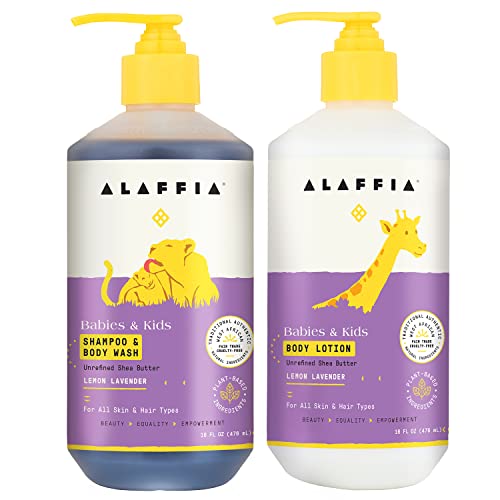
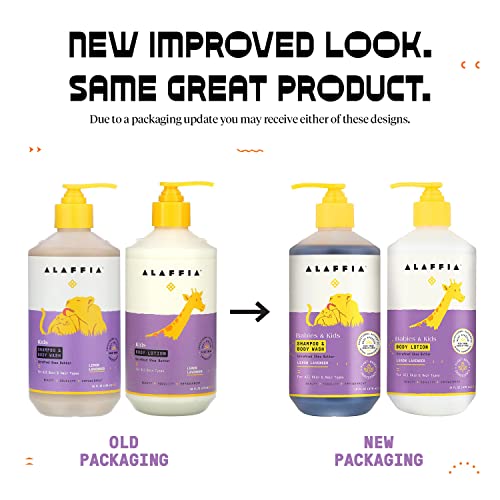
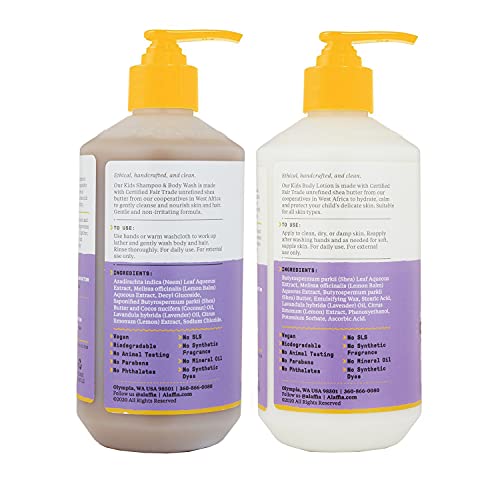
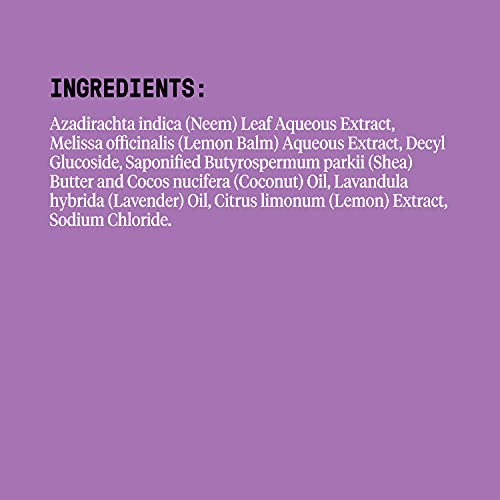
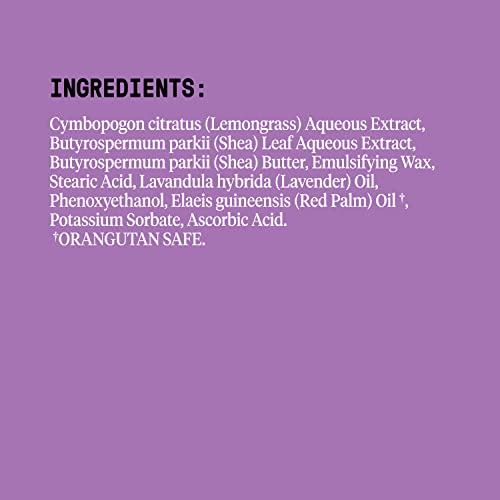
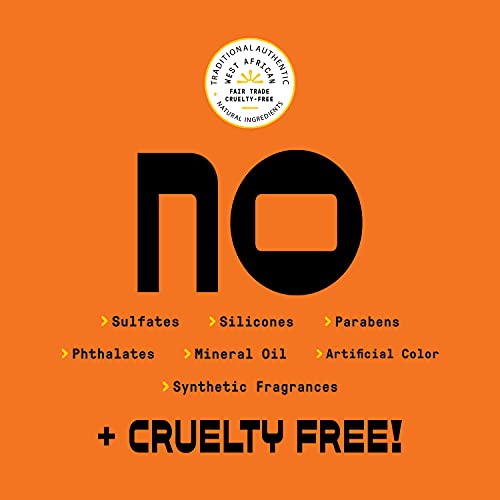

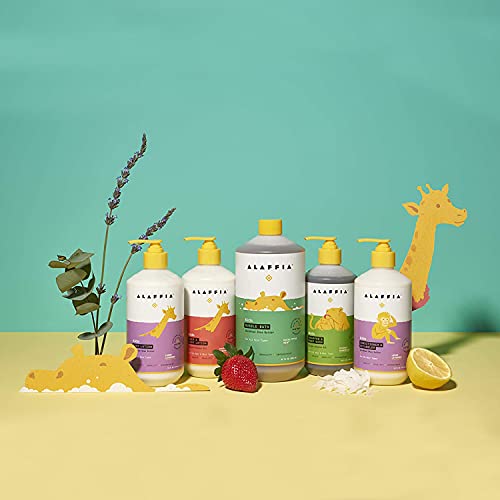
Alaffia Kids Shampoo & Body Wash Set - Nourishing, Natural Lemon Lavender - 16oz Each


Phenoxyethanol
Medium RiskPhenoxyethanol is a preservative used in cosmetics and personal care products to prevent microbial growth and extend shelf life. It is commonly found in formulations such as lotions, creams, and serums.
Sustai Insights
Phenoxyethanol serves effectively as a preservative, ensuring product stability and safety by inhibiting microbial growth. It is considered to have low health risks regarding carcinogenicity, allergies, and reproductive toxicity. However, moderate use restrictions exist, and regulatory bodies have advised caution in specific applications. Environmental concerns include its potential as a pollutant, although it is not highly bioaccumulative. Overall, the ingredient presents a medium risk level, with safe usage practices recommended and alternative preservatives available for those seeking greener options.
Potassium Sorbate
Medium RiskPotassium sorbate is a potassium salt of sorbic acid, primarily used as a preservative in food and cosmetic products. It inhibits the growth of molds, yeast, and some bacteria, extending the shelf life of products. It is commonly found in various formulations due to its effectiveness and low toxicity.
Sustai Insights
Potassium sorbate serves as an effective preservative, preventing microbial growth in food and cosmetic products, which is vital for safety and longevity. Although it has a low risk of carcinogenicity and developmental toxicity, there is a moderate concern regarding allergies and immunotoxicity. Environmentally, it poses minimal risks as it is not significantly bioaccumulative. Regulatory agencies have verified its use, although some products may face restrictions. Overall, it is assessed as a medium risk ingredient, with safe usage practices recommended, and alternatives such as natural preservatives could be considered.
Emulsifying Wax
Medium RiskEmulsifying wax is a mixture derived from plant and synthetic sources, primarily used to stabilize emulsions in cosmetic and personal care products. Its primary function is to blend oil and water-based ingredients, ensuring a uniform consistency and enhancing product texture.
Sustai Insights
Emulsifying wax offers functional benefits as an effective emulsifier, helping to create stable formulations in cosmetic products. It generally poses low health risks, with minimal concerns regarding carcinogenicity and allergenic potential. Environmental risks are also low, with no significant pollutant or bioaccumulation issues. However, use restrictions exist, and irritation potential is noted for sensitive skin. Regulatory assessments indicate it is safe for use within established concentration limits, leading to an overall moderate risk assessment. Alternatives like plant-based emulsifiers may offer sustainable options.
Decyl Glucoside
Low RiskDecyl glucoside is a glucose-based surfactant derived from natural sources, primarily used as a mild cleansing agent in personal care products. It effectively reduces surface tension, allowing for improved mixing of ingredients and enhanced cleansing properties without stripping natural oils from the skin.
Sustai Insights
Decyl glucoside offers functional benefits as a non-ionic surfactant, making it suitable for sensitive skin formulations. It is biodegradable and derived from renewable resources, supporting sustainability. Health risks are primarily low, with minimal concerns regarding irritation and allergies. Environmental risks are low, as it does not significantly contribute to pollution or bioaccumulation. Regulatory status is generally favorable, with low restrictions noted. Overall, decyl glucoside presents a low risk for use in consumer products, making it a suitable choice for gentle formulations.
Butyrospermum Parkii (Shea) Butter
Low RiskButyrospermum parkii (shea) butter is a vegetable fat derived from the nuts of the shea tree. It is commonly used in cosmetic formulations for its emollient properties, providing moisture and improving skin texture. Additionally, shea butter is known for its ability to enhance the stability of products and deliver a creamy texture.
Sustai Insights
Shea butter offers functional benefits as an effective moisturizer, enhancing skin barrier function and texture. It is sustainably sourced and biodegradable, contributing to eco-friendliness. Health-wise, it is associated with low risks for carcinogenicity, allergies, and reproductive toxicity. Environmental impacts are minimal, with no significant pollutant potential identified. Regulatory assessments indicate no current restrictions. Overall, the ingredient presents a low risk, making it a favorable choice in cosmetic formulations.
Citrus Limon (Lemon)
Low RiskCitrus limon, commonly known as lemon, is a citrus fruit used primarily for its juice and zest. It is often included in personal care products for its astringent properties and as a natural fragrance. It is recognized for its potential antioxidant benefits and as a source of vitamin C.
Sustai Insights
Citrus limon offers functional benefits like acting as a natural preservative and providing fragrance in formulations. It is sustainably sourced and biodegradable. Health risks are considered low for carcinogenicity, allergies, and reproductive toxicity. Environmental risks are minimal, with no significant bioaccumulation. Regulatory status is favorable, with no current restrictions noted. Overall, this ingredient poses a low risk, making it a safe choice for consumers.
Sea Salt
Low RiskSea salt is a mixture of inorganic salts derived primarily from the evaporation of seawater. It consists mainly of sodium chloride, with minor amounts of other minerals. Sea salt is commonly used as a seasoning and preservative in food products and may also have applications in cosmetics and personal care items.
Sustai Insights
Sea salt serves as an effective flavor enhancer and preservative, contributing to the taste and shelf-life of food products. It is generally considered safe with low risk for health concerns such as cancer, allergies, and reproductive toxicity. Environmental impact is minimal, as it does not contribute significantly to pollution or bioaccumulation. Regulatory bodies, including the FDA, currently do not impose restrictions on its use. Overall, the risk level associated with sea salt is low, making it a widely accepted ingredient with no significant adverse effects reported.
Cocos Nucifera (Coconut) Oil
Low RiskCocos Nucifera (Coconut) Oil is derived from the kernels of the coconut palm. It is primarily used in cosmetic formulations for its emollient and moisturizing properties, making it suitable for skin and hair care products.
Sustai Insights
Coconut oil serves as an effective moisturizer and emollient, promoting skin hydration and softness. It is sustainably sourced and biodegradable. Health risks are minimal, with low concerns regarding carcinogenicity, allergens, and reproductive toxicity. Environmental impact is also low, as it does not contribute significantly to pollution or bioaccumulation. Regulatory bodies have not issued restrictions on its use. Overall, coconut oil presents a low risk for health and environmental concerns, making it a safe ingredient in cosmetic products.
Stearic Acid
Low RiskStearic acid is a naturally occurring fatty acid commonly found in animal and vegetable fats. It functions primarily as an emulsifier, thickener, and stabilizer in cosmetic and personal care products, providing texture and consistency.
Sustai Insights
Stearic acid offers functional benefits such as effective emulsification and stabilization of formulations. It is derived from renewable sources and is biodegradable, contributing to its sustainability profile. Health risks are low, with minimal concerns regarding carcinogenicity, allergies, or reproductive toxicity. Environmental risks are also low, with no significant pollutants or bioaccumulation concerns noted. Regulatory bodies, including the FDA, do not impose restrictions on its use. Overall, stearic acid is assessed as low risk, and its safe usage practices are well-established, with no significant alternatives needed.
Ascorbic Acid (Vitamin C)
Low RiskAscorbic acid (Vitamin C) is a naturally occurring antioxidant essential for various biological functions, including collagen synthesis and immune response. It is commonly used in cosmetic and food products for its preservative properties and ability to enhance skin brightness.
Sustai Insights
Ascorbic acid provides functional benefits as an effective antioxidant and preservative, contributing to skin health and product stability. It is generally recognized as safe with low health risks, including minimal concerns for carcinogenicity and allergies. Environmentally, it poses low risks, as it is biodegradable and does not bioaccumulate. Regulatory bodies like the FDA have not imposed significant restrictions on its use. Overall, the ingredient presents a low risk, with safe usage practices ensuring consumer safety, and alternatives such as natural extracts exist for those seeking different formulations.
Decyl Glucoside
Low RiskDecyl glucoside is a glucose-based surfactant derived from natural sources, primarily used as a mild cleansing agent in personal care products. It effectively reduces surface tension, allowing for improved mixing of ingredients and enhanced cleansing properties without stripping natural oils from the skin.
Sustai Insights
Decyl glucoside offers functional benefits as a non-ionic surfactant, making it suitable for sensitive skin formulations. It is biodegradable and derived from renewable resources, supporting sustainability. Health risks are primarily low, with minimal concerns regarding irritation and allergies. Environmental risks are low, as it does not significantly contribute to pollution or bioaccumulation. Regulatory status is generally favorable, with low restrictions noted. Overall, decyl glucoside presents a low risk for use in consumer products, making it a suitable choice for gentle formulations.
Phenoxyethanol
Medium RiskPhenoxyethanol is a preservative used in cosmetics and personal care products to prevent microbial growth and extend shelf life. It is commonly found in formulations such as lotions, creams, and serums.
Sustai Insights
Phenoxyethanol serves effectively as a preservative, ensuring product stability and safety by inhibiting microbial growth. It is considered to have low health risks regarding carcinogenicity, allergies, and reproductive toxicity. However, moderate use restrictions exist, and regulatory bodies have advised caution in specific applications. Environmental concerns include its potential as a pollutant, although it is not highly bioaccumulative. Overall, the ingredient presents a medium risk level, with safe usage practices recommended and alternative preservatives available for those seeking greener options.
Butyrospermum Parkii (Shea) Butter
Low RiskButyrospermum parkii (shea) butter is a vegetable fat derived from the nuts of the shea tree. It is commonly used in cosmetic formulations for its emollient properties, providing moisture and improving skin texture. Additionally, shea butter is known for its ability to enhance the stability of products and deliver a creamy texture.
Sustai Insights
Shea butter offers functional benefits as an effective moisturizer, enhancing skin barrier function and texture. It is sustainably sourced and biodegradable, contributing to eco-friendliness. Health-wise, it is associated with low risks for carcinogenicity, allergies, and reproductive toxicity. Environmental impacts are minimal, with no significant pollutant potential identified. Regulatory assessments indicate no current restrictions. Overall, the ingredient presents a low risk, making it a favorable choice in cosmetic formulations.
Citrus Limon (Lemon)
Low RiskCitrus limon, commonly known as lemon, is a citrus fruit used primarily for its juice and zest. It is often included in personal care products for its astringent properties and as a natural fragrance. It is recognized for its potential antioxidant benefits and as a source of vitamin C.
Sustai Insights
Citrus limon offers functional benefits like acting as a natural preservative and providing fragrance in formulations. It is sustainably sourced and biodegradable. Health risks are considered low for carcinogenicity, allergies, and reproductive toxicity. Environmental risks are minimal, with no significant bioaccumulation. Regulatory status is favorable, with no current restrictions noted. Overall, this ingredient poses a low risk, making it a safe choice for consumers.
Sea Salt
Low RiskSea salt is a mixture of inorganic salts derived primarily from the evaporation of seawater. It consists mainly of sodium chloride, with minor amounts of other minerals. Sea salt is commonly used as a seasoning and preservative in food products and may also have applications in cosmetics and personal care items.
Sustai Insights
Sea salt serves as an effective flavor enhancer and preservative, contributing to the taste and shelf-life of food products. It is generally considered safe with low risk for health concerns such as cancer, allergies, and reproductive toxicity. Environmental impact is minimal, as it does not contribute significantly to pollution or bioaccumulation. Regulatory bodies, including the FDA, currently do not impose restrictions on its use. Overall, the risk level associated with sea salt is low, making it a widely accepted ingredient with no significant adverse effects reported.
Cocos Nucifera (Coconut) Oil
Low RiskCocos Nucifera (Coconut) Oil is derived from the kernels of the coconut palm. It is primarily used in cosmetic formulations for its emollient and moisturizing properties, making it suitable for skin and hair care products.
Sustai Insights
Coconut oil serves as an effective moisturizer and emollient, promoting skin hydration and softness. It is sustainably sourced and biodegradable. Health risks are minimal, with low concerns regarding carcinogenicity, allergens, and reproductive toxicity. Environmental impact is also low, as it does not contribute significantly to pollution or bioaccumulation. Regulatory bodies have not issued restrictions on its use. Overall, coconut oil presents a low risk for health and environmental concerns, making it a safe ingredient in cosmetic products.
Potassium Sorbate
Medium RiskPotassium sorbate is a potassium salt of sorbic acid, primarily used as a preservative in food and cosmetic products. It inhibits the growth of molds, yeast, and some bacteria, extending the shelf life of products. It is commonly found in various formulations due to its effectiveness and low toxicity.
Sustai Insights
Potassium sorbate serves as an effective preservative, preventing microbial growth in food and cosmetic products, which is vital for safety and longevity. Although it has a low risk of carcinogenicity and developmental toxicity, there is a moderate concern regarding allergies and immunotoxicity. Environmentally, it poses minimal risks as it is not significantly bioaccumulative. Regulatory agencies have verified its use, although some products may face restrictions. Overall, it is assessed as a medium risk ingredient, with safe usage practices recommended, and alternatives such as natural preservatives could be considered.
Stearic Acid
Low RiskStearic acid is a naturally occurring fatty acid commonly found in animal and vegetable fats. It functions primarily as an emulsifier, thickener, and stabilizer in cosmetic and personal care products, providing texture and consistency.
Sustai Insights
Stearic acid offers functional benefits such as effective emulsification and stabilization of formulations. It is derived from renewable sources and is biodegradable, contributing to its sustainability profile. Health risks are low, with minimal concerns regarding carcinogenicity, allergies, or reproductive toxicity. Environmental risks are also low, with no significant pollutants or bioaccumulation concerns noted. Regulatory bodies, including the FDA, do not impose restrictions on its use. Overall, stearic acid is assessed as low risk, and its safe usage practices are well-established, with no significant alternatives needed.
Ascorbic Acid (Vitamin C)
Low RiskAscorbic acid (Vitamin C) is a naturally occurring antioxidant essential for various biological functions, including collagen synthesis and immune response. It is commonly used in cosmetic and food products for its preservative properties and ability to enhance skin brightness.
Sustai Insights
Ascorbic acid provides functional benefits as an effective antioxidant and preservative, contributing to skin health and product stability. It is generally recognized as safe with low health risks, including minimal concerns for carcinogenicity and allergies. Environmentally, it poses low risks, as it is biodegradable and does not bioaccumulate. Regulatory bodies like the FDA have not imposed significant restrictions on its use. Overall, the ingredient presents a low risk, with safe usage practices ensuring consumer safety, and alternatives such as natural extracts exist for those seeking different formulations.
Emulsifying Wax
Medium RiskEmulsifying wax is a mixture derived from plant and synthetic sources, primarily used to stabilize emulsions in cosmetic and personal care products. Its primary function is to blend oil and water-based ingredients, ensuring a uniform consistency and enhancing product texture.
Sustai Insights
Emulsifying wax offers functional benefits as an effective emulsifier, helping to create stable formulations in cosmetic products. It generally poses low health risks, with minimal concerns regarding carcinogenicity and allergenic potential. Environmental risks are also low, with no significant pollutant or bioaccumulation issues. However, use restrictions exist, and irritation potential is noted for sensitive skin. Regulatory assessments indicate it is safe for use within established concentration limits, leading to an overall moderate risk assessment. Alternatives like plant-based emulsifiers may offer sustainable options.
Discover the Alaffia Babies and Kids Shampoo & Body Wash and Body Lotion set—a gentle, plant-based bathing solution designed for delicate skin and hair. Infused with a refreshing lemon lavender scent, this paraben and sulfate-free duo offers a nurturing cleanse and hydration for your child’s sensitive skin.
- Gentle Cleansing: This shampoo and body wash effectively nourishes and softens hair and skin, making it perfect for everyday use.
- Skin-Friendly Ingredients: Made with natural ingredients, this product is suitable for all ages, ensuring safe use even on the most delicate skin types.
- Hydrating Body Lotion: Complement your bath routine with a body lotion that hydrates and protects, leaving skin smooth and nourished.
- Eco-Conscious Formulation: Vegan and cruelty-free, this product is free from sulfates, parabens, and synthetic fragrances, promoting a healthier environment.
- Community Impact: By choosing Alaffia, you support fair trade practices that empower communities in Togo, West Africa, fostering a positive social impact.
Subscribe & Save with Sustai
- Best Price Guarantee: Always enjoy the lowest prices on sustainable home essentials.
- No Surprises: We’ll notify you before shipping. No hidden fees, ever.
- You’re in Charge: Change, pause, or cancel your subscription anytime with ease.
- Eco-Friendly Deliveries: Our grouped shipments mean less packaging and lower emissions.
Join us on a sustainable journey. Special offers for a limited time! Prices and promotions may change.
Recommended Products
Discover the Alaffia Babies and Kids Shampoo & Body Wash and Body Lotion set—a gentle, plant-based bathing solution designed for delicate skin and hair. Infused with a refreshing lemon lavender scent, this paraben and sulfate-free duo offers a nurturing cleanse and hydration for your child’s sensitive skin.
- Gentle Cleansing: This shampoo and body wash effectively nourishes and softens hair and skin, making it perfect for everyday use.
- Skin-Friendly Ingredients: Made with natural ingredients, this product is suitable for all ages, ensuring safe use even on the most delicate skin types.
- Hydrating Body Lotion: Complement your bath routine with a body lotion that hydrates and protects, leaving skin smooth and nourished.
- Eco-Conscious Formulation: Vegan and cruelty-free, this product is free from sulfates, parabens, and synthetic fragrances, promoting a healthier environment.
- Community Impact: By choosing Alaffia, you support fair trade practices that empower communities in Togo, West Africa, fostering a positive social impact.

You can have at most 2 Sustainable Steals products in your cart
Customer Reviews
Customers’ View
Customers generally appreciate the gentle formulation of this Kids Shampoo and Body Wash, highlighting its suitability for sensitive skin. Many users have noted that the product leaves no residue and provides a clean feeling without overwhelming scents, with one customer stating, "Just feels clean without being overpowered with scent." The inclusion of natural ingredients like fair trade shea butter and coconut oil resonates particularly well with health-conscious consumers. However, some feedback indicates room for improvement, with one reviewer noting a preference for a more moisturizing option. Overall, this product is recognized for its eco-friendly ingredients and effectiveness, making it a trusted choice for families seeking gentle bath essentials.
AI-generated from the text of customer reviewsThis product has no reviews yet.





